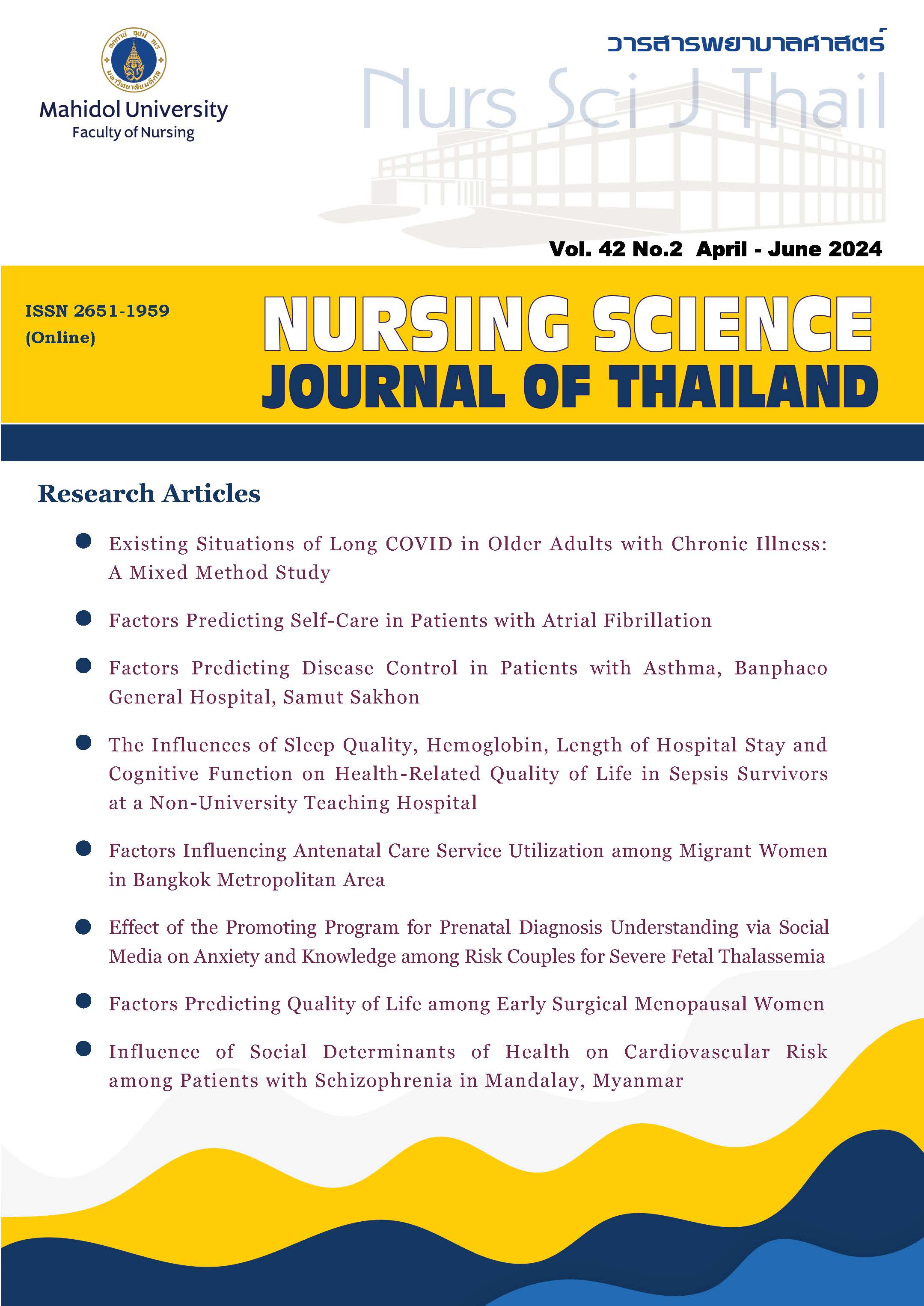อิทธิพลของคุณภาพการนอนหลับ ฮีโมโกลบิน ระยะเวลาการนอนโรงพยาบาลและการรู้คิดต่อคุณภาพชีวิตด้านสุขภาพในผู้รอดชีวิตจากการติดเชื้อในกระแสเลือด ที่โรงพยาบาลศูนย์แพทยศาสตร์ศึกษาไม่สังกัดมหาวิทยาลัยแห่งหนึ่ง
Main Article Content
บทคัดย่อ
วัตถุประสงค์: เพื่อศึกษาอำนาจการทำนายของคุณภาพการนอนหลับ ระดับฮีโมโกลบิน ระยะเวลาการนอนโรงพยาบาล และการรู้คิดต่อคุณภาพชีวิตด้านสุขภาพของผู้รอดชีวิตจากการติดเชื้อในกระแสเลือด
รูปแบบการวิจัย: การศึกษารูปแบบความสัมพันธ์เชิงทำนาย
วิธีดำเนินการวิจัย: กลุ่มตัวอย่าง คือผู้ป่วยหลังจากการติดเชื้อในกระแสเลือดอายุ 18 ปีขึ้นไป จำนวน 102 ราย ที่เข้ารับการรักษาในแผนกผู้ป่วยอายุรกรรม ที่โรงพยาบาลศูนย์แพทยศาสตร์ศึกษาไม่สังกัดมหาวิทยาลัยแห่งหนึ่งเก็บข้อมูลโดยใช้ 1) แบบบันทึกข้อมูลส่วนบุคคลและประวัติการเจ็บป่วยของผู้รอดชีวิตจากการติดเชื้อในกระแสเลือด 2) แบบประเมินคุณภาพชีวิตด้านสุขภาพ 3) แบบประเมินคุณภาพการนอนหลับ และ 4) แบบประเมินการรู้คิด วิเคราะห์ข้อมูลโดยใช้สถิติพรรณนาและการวิเคราะห์ถดถอยเชิงพหุคูณ
ผลการวิจัย: คุณภาพชีวิตด้านสุขภาพของผู้รอดชีวิตจากการติดเชื้อในกระแสเลือดอยู่ในระดับปานกลาง มีค่าเฉลี่ย 0.55 (SD = 0.39) ผลการวิเคราะห์ถดถอยพหุคูณพบว่าตัวแปรอิสระทั้งหมดสามารถอธิบายความแปรปรวนของคุณภาพชีวิตด้านสุขภาพของผู้รอดชีวิตจากการติดเชื้อในกระแสเลือดได้ร้อยละ 50 (adjusted R2 = .50) โดยคุณภาพการนอนหลับสามารถทำนายคุณภาพชีวิตด้านสุขภาพของผู้รอดชีวิตจากการติดเชื้อในกระแสเลือดได้มากที่สุด ( = .49, p < .001) รองลงมาคือ การรู้คิด (
= .31, p < .001)
สรุปและข้อเสนอแนะ: คุณภาพการนอนหลับและการรู้คิดเป็นปัจจัยที่ส่งผลต่อการมีคุณภาพชีวิตลดลงของผู้รอดชีวิตจากการติดเชื้อในกระแสเลือด ลการศึกษานี้สนับสนุนความสำคัญของการประเมินคุณภาพนอนหลับและการรู้คิดของผู้ป่วยที่รอดชีวิตจากการติดเชื้อในกระแสเลือด และนำไปสู่การพัฒนาโปรแกรมการพยาบาลเพื่อการฟื้นฟูสภาพและส่งเสริมคุณภาพชีวิตของผู้ป่วยที่รอดชีวิตจากการติดเชื้อในกระแสเลือด
Article Details

อนุญาตภายใต้เงื่อนไข Creative Commons Attribution-NonCommercial-NoDerivatives 4.0 International License.
ลิขสิทธิ์: วารสารพยาบาลศาสตร์เป็นเจ้าของลิขสิทธิ์ในการเผยแพร่ผลงานที่ตีพิมพ์ ห้ามผู้ใดนำบทความที่ได้รับการตีพิมพ์ในวารสารพยาบาลศาสตร์ไปเผยแพร่ในลักษณะต่างๆ ดังต่อไปนี้ การส่งบทความไปตีพิมพ์เผยแพร่ที่อื่น การนำบทความเผยแพร่ออนไลน์ การถ่ายเอกสารบทความเพื่อกิจกรรมที่ไม่ใช่การเรียนการสอน ยกเว้นเสียแต่ได้รับอนุญาตจากวารสารพยาบาลศาสตร์

Disclaimer: เนื้อหาบทความหรือข้อคิดเห็นใดๆ ในวารสารพยาบาลศาสตร์ ถือเป็นความรับผิดชอบของผู้เขียน กองบรรณาธิการไม่จำเป็นต้องเห็นด้วยและไม่มีส่วนรับผิดชอบแต่อย่างใด
เอกสารอ้างอิง
Evans L, Rhodes A, Alhazzani W, Antonelli M, Coopersmith CM, French C, et al. Surviving sepsis campaign: international guidelines for management of sepsis and septic shock 2021. Intensive Care Med. 2021;47(11):1181-247. doi: 10.1007/s00134-021-06506-y.
Rudd KE, Johnson SC, Agesa KM, Shackelford KA, Tsoi D, Kievlan DR, et al. Global, regional, and national sepsis incidence and mortality, 1990-2017: analysis for the global burden of disease study. Lancet. 2020;395(10219):200-11. doi: 10.1016/S0140-6736(19)32989-7.
Strategy and Planning Division, Department of Health, Ministry of Public Health. Public health statistics A.D. 2018 [Internet]. Nonthaburi: Department of Health, Ministry of Public Health; 2019. [cited 2020 Jan 5]. Available from: https://www.dohdatacenter.anamai.moph.go.th. (in Thai).
Shankar-Hari M, Harrison DA, Ferrando-Vivas P, Rubenfeld GD, Rowan K. Risk factors at index hospitalization associated with longer-term mortality in adult sepsis survivors. JAMA Netw Open. 2019;2(5):e194900. doi: 10.1001/jamanetworkopen.2019.4900.
Apitzsch S, Larsson L, Larsson AK, Linder A. The physical and mental impact of surviving sepsis a qualitative study of experiences and perceptions among a Swedish sample. Arch Public Health. 2021;79(1):66. doi: 10.1186/s13690-021-00585-5.
Singer M, Deutschman CS, Seymour CW, Shankar-Hari M, Annane D, Bauer M, et al. The third international consensus definitions for sepsis and septic shock (Sepsis-3). JAMA. 2016;315(8):801-10. doi: 10.1001/jama.2016.0287.
Huang CY, Daniels R, Lembo A, Hartog C, O'Brien J, Heymann T, et al. Life after sepsis: an international survey of survivors to understand the post-sepsis syndrome. Int J Qual Health Care. 2019;31(3):191-8. doi: 10.1093/intqhc/mzy137.
Royal Institute of Thailand. Dictionary A.D.1999. 4th ed. Bangkok: Aksorn; 2003. 1436 p. (in Thai).
Nannan Panday RS, Minderhoud TC, Chantalou DS, Alam N, Nanayakkara PWB. Health related quality of life in sepsis survivors from the prehospital antibiotics against sepsis (PHANTASi) trial. PLoS ONE. 2019;14(10):e0222450. doi: 10.1371/journal.pone.0222450.
Wilson IB, Cleary PD. Linking clinical variables with health-related quality of life. A conceptual model of patient outcomes. JAMA. 1995;273(1):59-65.
McKinley S, Fien M, Elliott R, Elliott D. Health-related quality of life and associated factors in intensive care unit survivors 6 months after discharge. Am J Crit Care. 2016;25(1):52-8. doi: 10.4037/ajcc2016995.
Alexopoulou C, Bolaki M, Akoumianaki E, Erimaki S, Kondili E, Mitsias P, et al. Sleep quality in survivors of critical illness. Sleep Breath. 2019;23(2):463-71. doi: 10.1007/s11325-018-1701-z.
Fleischmann-Struzek C, Rose N, Freytag A, Spoden M, Prescott HC, Schettler A, et al. Epidemiology and costs of postsepsis morbidity, nursing care dependency, and mortality in Germany, 2013 to 2017. JAMA Netw Open. 2021;4(11):e2134290. doi: 10.1001/jamanetworkopen.2021.34290.
Wouters HJCM, van der Klauw MM, de Witte T, Stauder R, Swinkels DW, Wolffenbuttel BHR, et al. Association of anemia with health-related quality of life and survival: a large population-based cohort study. Haematologica. 2019;104(3):468-76. doi: 10.3324/haematol.2018.195552.
Rabin R, de Charro F. EQ-5D: a measure of health status from the EuroQol Group. Ann Med. 2001;33(5):337-43. doi: 10.3109/07853890109002087.
Pattanaphesaj J. Health-related quality of life measure (EQ-5D-5L): measurement property testing and its preference-based score in Thai population [dissertation]. Bangkok: Mahidol University; 2014. 180 p. (in Thai).
Snyder-Halpern R, Verran JA. Instrumentation to describe subjective sleep characteristics in healthy subjects. Res Nurs Health. 1987;10(3):155-63. doi: 10.1002/nur.4770100307.
Rojjanakitti P. Relationships between personal factors, environmental factors and sleep quality in surgical patients after operation [master’s thesis]. Bangkok: Chulalongkorn University; 2001. 123 p. (in Thai).
Poungvarin N. Loss of cognition in the elderly. Siriraj Medical Journal. 1993;2(46):139-49. (in Thai).
Mostel Z, Perl A, Marck M, Mehdi SF, Lowell B, Bathija S, et al. Post-sepsis syndrome - an evolving entity that afflicts survivors of sepsis. Mol Med. 2019;26(1):6. doi: 10.1186/s10020-019-0132-z.
Jung SM, Kim YJ, Ryoo SM, Kim WY. Relationship between low hemoglobin levels and mortality in patients with septic shock. Acute Crit Care. 2019;34(2):141-7. doi: 10.4266/acc.2019.00465.


